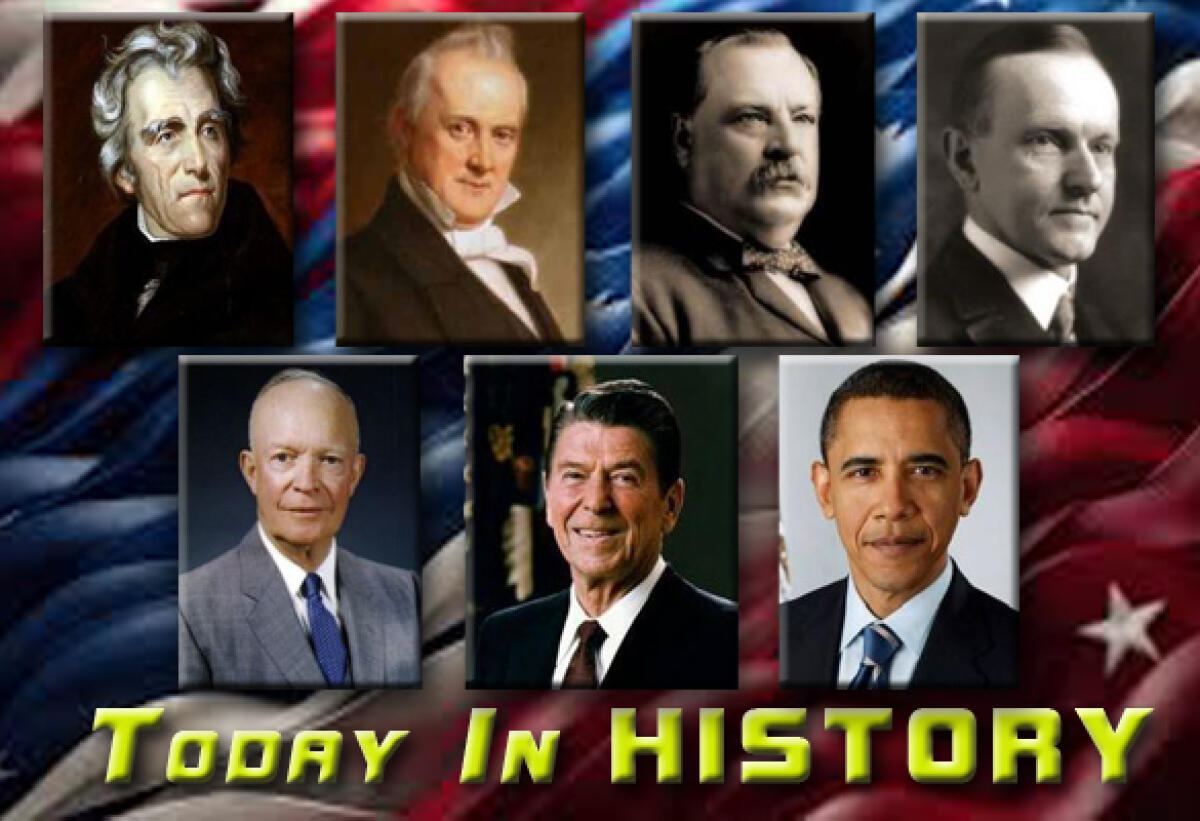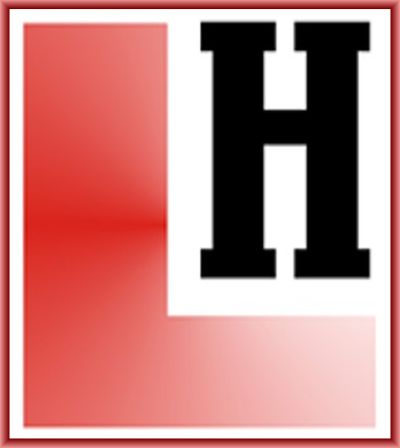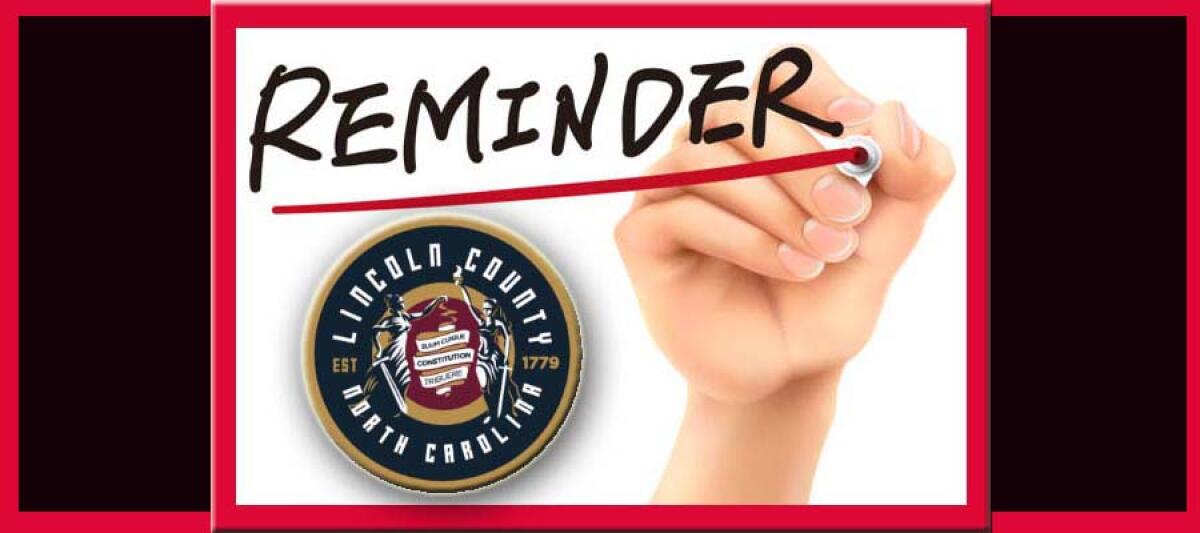- Friday, 23 January 2026
- Have a HOT TIP? Call 704-276-6587 or E-mail us At LH@LincolnHerald.com
Today In History – November 4
There are 57 days remaining until the end of the year.

(Public Domain Photos)
Today in History the following were elected President of the United States: 1828 Andrew Jackson, 1856 James Buchanan, 1884 Grover Cleveland is elected for his first term, 1924 Calvin Coolidge is elected to continue after Harding’s term, 1952 Dwight D. Eisenhower is elected, 1980 Ronald Reagan is elected defeating Jimmy Carter; and in 2008 Barack Obama wins the over Senator John McCain.
The On This Day In History archives at “Simple English Wikipedia, The Free Encyclopedia” contains over 200,000 events, birthdays and deaths from 6,000 years of history. Here is a roundup of a few of them:
November 4 is the 308th day of the year (309th in leap years) in the Gregorian calendar. There are 57 days remaining until the end of the year.
EVENTS
1493 - Christopher Columbus lands on Guadeloupe.
1501 - Catherine of Aragon meets Arthur Tudor, the brother of Henry VIII of England.
1576 - Eighty Years' War: Spain captures Antwerp, Flanders.
1677 – Future queen Mary II of England marries future king William III of England.
1783 - Wolfgang Amadeus Mozart's Symphony No. 36 is performed for the first time in Linz, Austria.
1786 - Jean-François de Galaup, comte de Lapérouse lands on an island in the Northwestern Hawaiian Islands, which he names after Jacques Necker.
1798 - Beginning of the Russo-Ottoman Siege of Corfu.
1828 - Andrew Jackson is elected President of the United States.
1847 - Scottish doctor James Young Simpson discovers the anaesthetic properties of chloroform.
1852 - Count Camillo Benso di Cavour becomes Prime Minister of Piedmont-Sardinia, which later expands to become Italy.
1856 - James Buchanan is elected President of the United States.
1861 - The University of Washington is founded.
1864 - American Civil War: Battle of Johnson - Confederate troops bombard a Union supply base and destroy millions of dollars of material.
1875 - Paddle steamer Pacific collides with Orpheus sailing boat off Cape Flattery, Washington, killing 273 people.
1884 - Grover Cleveland is elected to his first term as President of the United States.
1890 - London's deep-level railway opens between King William Street and Stockwell.
1918 – World War I: Austria-Hungary surrenders to Italy.
1921 – Prime Minister of Japan Hara Takashi is murdered.
1921 - Italy's unknown soldier is buried in the Fatherland Altar in Rome.
1922 – A team of archaeologists led by Howard Carter finds the tomb of Tutankhamun in Egypt.
1924 - Calvin Coolidge is elected to continue as President of the United States, after he had served out Warren G. Harding's term.
1924 - Nellie Tayloe Ross of Wyoming becomes the first woman elected governor in a US State.
1942 - World War II: Second Battle of El Alamein - Disobeying a direct order from Adolf Hitler, General Field Marshal Erwin Rommel leads his forces to a five-month retreat.
1950 - European Convention on Human Rights is adopted.
1952 - The United States Government creates the National Security Agency.
1952 – Dwight D. Eisenhower is elected President of the United States.
1955 – The rebuilt Vienna State Opera is re-opened.
1956 – Soviet troops crush the Hungarian Revolution. Thousands are killed.
1960 - In Tanzania, Jane Goodall observes chimpanzees making tools, the first-ever such observation in non-humans.
1966 - The Arno River in Florence, Italy floods at record levels, making thousands homeless and destroying millions of masterpieces of art and rare books.
1970 - Genie, aged 13, is found in Los Angeles, having been locked in her bedroom for most of her life until that point.
1977 - The UN ends its weapons embargo on Apartheid-era South Africa.
1979 - The Iran hostage crisis begins - A group of Iranians, mostly students, invades United States Embassy in Tehran, Iran, and takes 90 people hostage, including 53 Americans.
1980 – Ronald Reagan is elected President of the United States, defeating Jimmy Carter.
1984 - French Pay-TV channel Canal+ starts transmission.
1991 - Imelda Marcos, former First Lady of the Philippines, is given a Presidential pardon by Corazon Aquino.
1993 - A China Airlines Boeing 747 overruns Runway 13 at Hong Kong's Kai Tak International Airport while landing during a typhoon, injuring 22 people.
1993 - Jean Chrétien becomes Prime Minister of Canada.
1994 - The first conference focusing exclusively on the subject of the commercial potential of the World Wide Web is held in San Francisco, California.
1995 – Israeli Prime Minister Yitzhak Rabin is murdered, being shot dead by Yigal Amir.
1999 - Ilir Meta becomes Prime Minister of Albania.
2001 - Northern Ireland: The Police Service of Northern Ireland is created, replacing the Royal Ulster Constabulary.
2005 – Nintendo's Game Boy Micro is released in Europe.
2006 - A widespread power failure affects parts of Western Europe.
2008 – Barack Obama wins the vote to become President of the United States, over Senator John McCain. Obama becomes the US' first African American President.
2010 - Aero Caribbean Flight 883 crashes in central Cuba, killing all 68 people on board.
2014 - US Mid-term elections are held, with the Republican Party reclaiming the majority it lost in the Senate in 2006.
2015 - Justin Trudeau becomes Prime Minister of Canada.
2015 - A cargo plane crashes near Juba International Airport in South Sudan, killing 37 people.
2015 - A building collapses in Lahore, Pakistan, killing 45 people.
2016 - The Paris climate change agreement enters into force.
2018 - New Caledonia holds an independence referendum, where a smaller-than expected majority (56%) votes to remain an overseas territory of France.
2019 - Sir Lindsay Hoyle is chosen to succeed John Bercow as Speaker of the House of Commons of the United Kingdom.

 Lincoln Herald Staff
Lincoln Herald Staff
















